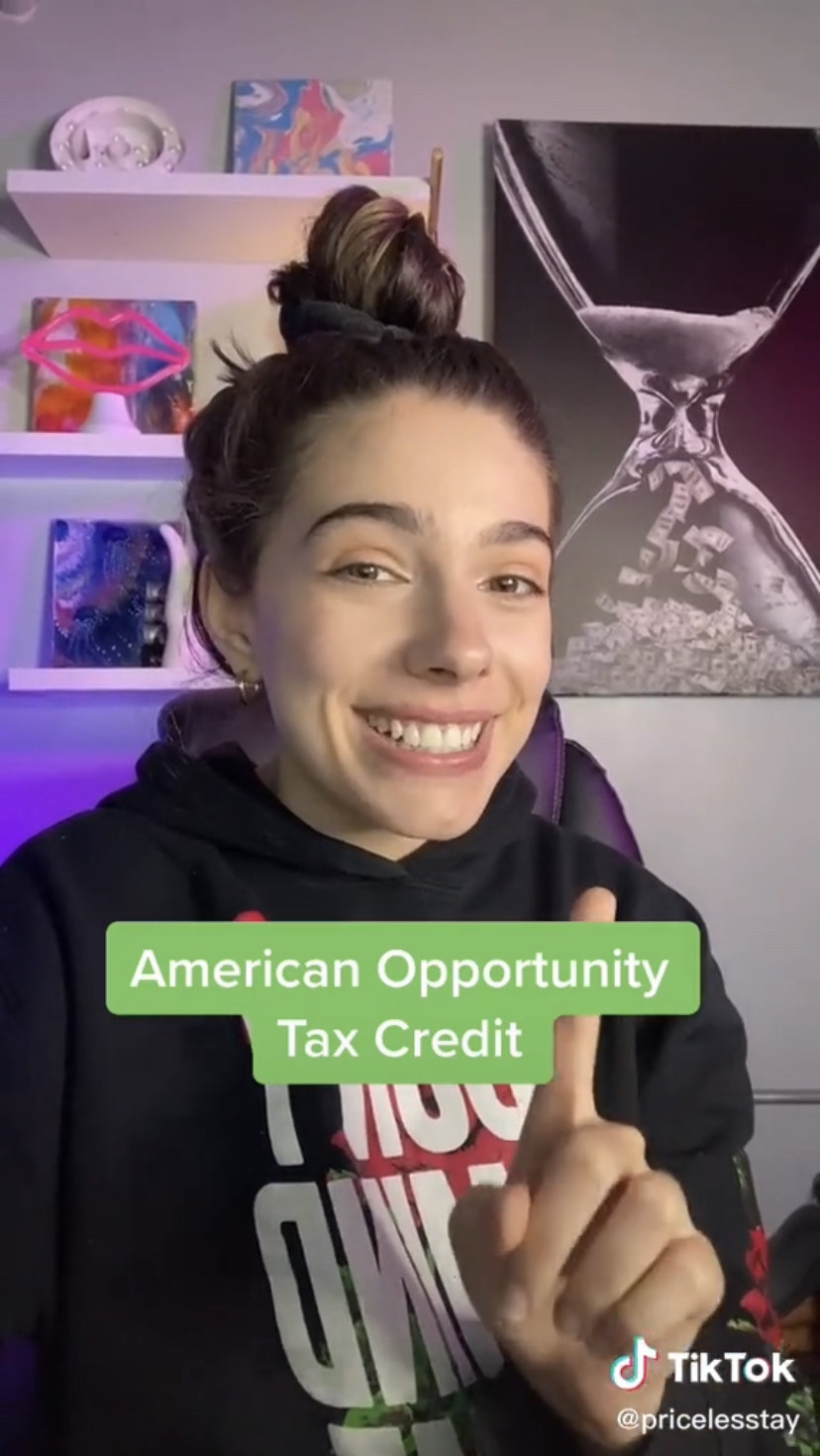Hi, I'm Grace and I'm a junior in high school. I'm the editor-in-chief of my school's paper and I consider myself to be an active member of the ✨FinTok✨ community. In my years of schooling, I've learned a lot, from shapes to English rhetoric to World War II. But the stock market and tax returns? Not so much. That's where TikTok came in.
Taylor Price, aka @pricelesstay, is one of my favorite TikTokers who frequently posts videos about her financial experiences and money tips, and I've learned so much from watching her videos.
After picking up these tips from Taylor's TikTok, I did my own outside research on the Balance and Investopedia to learn even more.
Here are 7 important money lessons I've learned thanks to TikTok:
1. You can start saving for retirement early by opening a Roth IRA.

And here are a few more important things to know about Roth IRAs:
Roth IRAs are individual retirement accounts that ~anyone~ can open, as long as you've earned income. However, your income must come from a job or self-employment, such as babysitting or lifeguarding, so this doesn't include your allowance or pay you've gotten from your parents to do chores. In a year, you can contribute up to $6,000 of your earned income if you're under 50.
2. Teens can use a custodial account to start investing in stocks and funds.

And here are some other important things you should know:
Your parent or guardian will be able to control the custodial account until you become an adult — then it transfers to your name only. If you're just getting started on investing and don't know where to begin, you might try buying a stock and watching how it performs over time. This will give you a better idea of how the stock market works. Just remember that all investments come with some risk, so don't invest money that you might need any time soon.
3. A bear market and a bull market are opposites of each other — and what this means for you depends on your investing style.
Depending on how you invest, you might care if it's a bear market vs. a bull market, or it might not really matter to you.
There are various different types of investors and investing styles. For example, a day trader buys and sells stocks regularly based on market activity, so this type of trader will likely use different strategies during a bear market as opposed to during a bull market. On the other hand, a buy-and-hold investor typically buys stocks and holds on to them for long periods of time, despite market fluctuations. This kind of investor may not change the way they invest as stock prices go up and down because they're waiting to see if the market will continue trending upward over time. Investing styles are personal preferences that depend on your needs, budget, and risk tolerance.
4. The 50/30/20 rule can help you figure out how to budget your money in college and beyond.
But this rule isn't so set in stone. You can change up the percentages to better match your situation.
This rule can be customized to your lifestyle. For example, if you live in an area with a high cost of living, you may find that a 60/20/20 rule works better for you. Regardless, the categories stay the same. The largest percentage is for bills and payments that are necessary; this includes rent, insurance, groceries, and transportation to get to work and school. The second percentage should go toward your wants: vacations, electronic gadgets, takeout, and so forth. The last percentage is for savings and goals, like making regular deposits in your IRA and paying down student loans.
However you split up your budget, it's a good idea to make sure that you're always paying into your needs, wants, and savings.
5. If you're an undergraduate in college, you may be eligible for the American Opportunity Tax Credit.

Here's how to qualify for the American Opportunity Tax Credit:
To be eligible for the American Opportunity Tax Credit, you must be pursuing a degree or other education credential in a college or university. You also have to be enrolled for at least half of an academic period. Make sure that you read the requirements to claim the American Opportunity Tax Credit carefully before you submit your documents. If the IRS finds that your claim is invalid, you'll have to pay back the sum you received with interest and they may charge you a penalty.
6. Building a good credit score is super important and you can actually start while you're still a teen by becoming an authorized user on a parent or guardian's credit card.

Here's how becoming an authorized user helps you build credit:
There are five factors that go into your credit score: payment history, credit utilization, age of credit, types of credit, and new credit inquiries. Being an authorized user adds information on payment history, age of credit, and credit utilization to your credit report. For example, if your guardian adds you as an authorized user on a credit card that they've been paying off on time for more than a decade, that will add years of information to your credit report — which means you don't have to build your credit score from scratch.
Your credit scores are calculated based on information found on your credit report and will influence your ability to buy a house, get certain jobs, take out a loan, and more, so it's important to start building your credit early on.
7. There are various credit card options to fit your needs — and applying for your first one might be easier than you think.

And here's what you should know about opening your first credit card:
If you're younger than 21 years old and applying for a credit card, you'll either need to get a co-signer or show proof that you have a job in order to get approved. However, if neither of those are an option for you, you might consider opening a joint credit card with a parent or becoming an authorized user on their credit card.
It's a good idea to learn how credit cards work *before* you start using them, so you might also want to check out these 21 essential credit card tips.
Are you learning about money on TikTok too? Tell us about it in the comments below!
And for more money tips and tricks, check out the rest of our personal finance posts.
